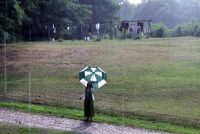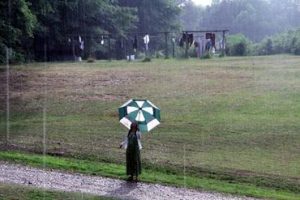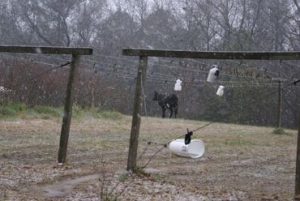When I lived in the city I always dreamed of the day that I might have a big clothesline. My fantasy began as a teenager in Washington, DC. My mom set up a small line in our big-for-the-city backyard and I fell in love with the smell and feel of sun-dried clothes. When I began a family of my own in Philadelphia I hung diapers and sheets on lines that criss-crossed over our cement postage-stamp of a yard. Sometimes I would chat across the chain-link fence with a neighbor who also hung her clothes. She lamented that fences now divided up the yards and alley in which children would play and community would form as clothes fluttered in the breeze.
Now that I live with my family at Jubilee Partners, a Christian service community in Comer, Georgia, my dream of a giant community clothesline has come true. And of course, as with most fantasies, the dream is tempered by reality.
As a small way to reduce our energy consumption, our community of about 40 staff and volunteers shares two (three, if they are all working) washing machines and one huge clothesline. The clothesline consists of 15 70-foot-long steel lines strung between three sets of very sturdy posts. When three families started this community in 1979 the clothesline was one of the first things they built. There is a laundry sign-up sheet in which each person or family has one or two two-hour slots a week in which to use the washing machines. We also have time set aside to wash guest linens, kitchen linens, and cleaning rags. The shared clothespins hang in sturdy gallon jugs that once held vinegar or maple syrup.
A community clothesline does much more than dry clothes with solar power; it can help to build community. It teaches the need for better cooperation and communication, requires deeper attention to the rhythms of nature, and provides a place for quiet contemplation and good conversation as well.
On a “perfect” day I will have our wash done very early and hang the clothes in the golden dewy morning to the serenade of birds flitting between blueberry bushes. After lunch I will check my laundry and find it nicely dried by the sun and breeze and I will have time to get it folded before the kids get home from school. It’s a good thing I have a few days like that to remember on the not-so-good days…like those when clean wash sours in a basket after a day of patiently waiting to be hung while my family and I flutter in six different directions; or when I bump my head as I try to hang or take in clothes in the dark because I can’t find the headlamp or batteries for it. One evening my husband was taking in the clothes by moonlight when he saw three skunks digging in the grass beneath the clotheslines. Thankfully they did not spray. If they had I would be writing the story, “The day I gave up on the clothesline.”
This summer we got so much rain that it really put my love for line drying to the test. Clothes would hang hopelessly sodden as the rain poured day and night without mercy. Some things would be so heavy with water that they would touch the ground below and need to be washed again. Sometimes towels would dry so slowly that they would begin to mildew and smell worse than before they were washed. The sun would shine and we would all rush to get laundry done and hung, but before the clothes had time to dry the storm clouds would form and we would then rush to bring in damp clothes before they became drenched. When the line is just not an option laundry hangs from makeshift lines in bedrooms, living rooms, and porches. On one particularly bad day, the rain seemed to finally break and the forecast called for only a 20 percent chance of rain but it poured three times. One community member shook his fist at the clouds in anger and drove his clothes to the local Laundromat to tumble dry. We do have our limits.
Though the heavy rains are bad, there are other forces of nature that can also hamper the romance of line drying. Here are some things I have learned: Hang clothes in mid-day and suffer the sun’s heat, wait until evening and get bit by mosquitoes, oh and watch out for the fire ant hills. One can always hang clothes on the shady side of the line to avoid the heat of the sun, but during mulberry and blueberry season purple bird droppings will remind you that comfort comes at a price. It is important to pin things securely because heavy winds can tangle sheets and send clothes flying. One must take care to bring clothes in promptly and give them a good firm shaking lest wasps, bats, and bees take up residence. It is nice to let young children play in the sand while you are hanging laundry but be sure to grab those sandy hands before they grab your neighbor’s clean sheets. Frozen fingers on crisp frosty clothes add an extra challenge to winter drying; be sure to dress warmly or just hang your wash to dry inside by the wood stove to get through the coldest days.
This practice of line drying also connects us with the majority of the people in the world who do not have dryers. As I was enjoying hanging laundry on a pleasant day my friend confided to me, “I hate hanging laundry.” She grew up the youngest in a large family in rural Mexico and has put in countless hours hanging and taking down laundry. “It just takes too much time.” Her honesty reminds me that my appreciation of line drying does not immediately impact the lives of my global neighbors and they aren’t all enjoying it as much as I do. Yet I am still thankful that my kids are learning and working alongside her kids and sharing a common experience, even if they don’t wax poetic about it the way I do. I do hope that even if we can’t see it, our local choice to use less electricity is making a long-term difference for our neighbors around the world.
Through it all, we are certainly saving electricity, but there are times that I do still wonder, like my friend, about the overall efficiency of hanging out all our laundry to dry. Surely, we all could find other things to do with our time than brave the elements while we pin and unpin clothes from a line, day after day, week after week, month after month. Are those hours truly a good use of our corporate human energy?
The fact that we are all in it together makes a huge difference. Sometimes an unfinished conversation will carry over the next morning at the clothesline. Sometimes it is only at the clothesline where folks that don’t normally make time to talk are standing still long enough to really check in with one another. There are times when my day has been so packed that I’ve even suggested, “meet me at the clothesline” as a place for deeper conversation to happen. Even times of solitude at the line are valuable. Carefully pinning each item, I sing to myself and remember to pray for and give thanks for each member of my family. Glancing over at the sheets and embroidered pillowcases of a newlywed couple or the diapers of a new baby or the blouses of an elderly member or the bike clothes of an avid cyclist, I am reminded to pray for them too and be thankful for their presence in our community.
And yes, we see each other’s underwear; this makes it hard to take yourself or other people too seriously. It can hardly be called heroic work to put our lives on the line in this way. In fact in this age of productivity and efficiency it could seem more foolish than valiant. But the daily task of hanging laundry forces us to slow down and it keeps us connected to the earth, to one another, and even—if we keep our hearts open—to God. Meet me at the clothesline if you want to talk more about it.

















